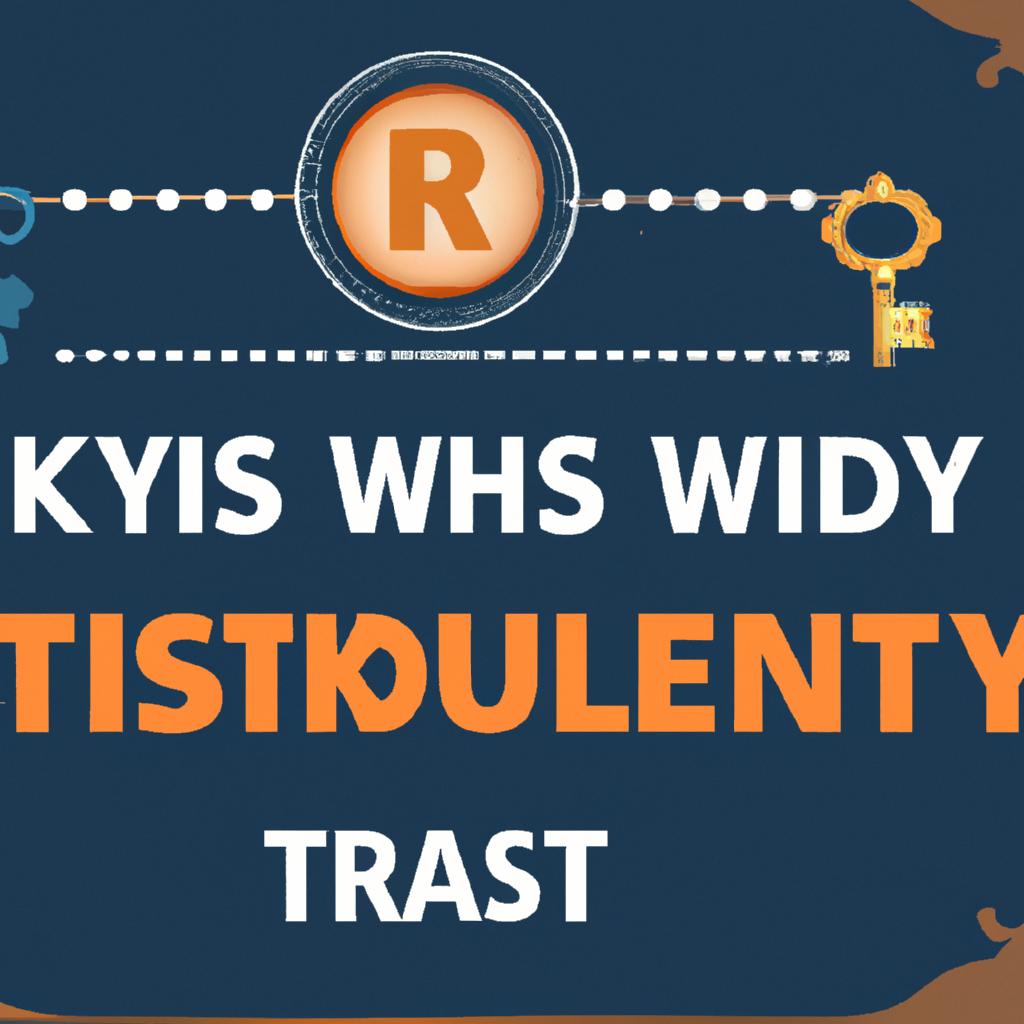The challenge of estate planning is a frequent issue encountered by many individuals aiming to safeguard their wealth and ensure their loved ones are provided for after their demise. A critical decision in this process is the choice between establishing a trust or a will. Both are vital tools in estate planning, but each presents unique benefits and potential drawbacks that can greatly influence how your assets are distributed. By grasping the fundamental differences between a trust and a will, you can make a well-informed choice that aligns with your future objectives and preferences.
Comprehending the Function of a Will and Trust
A key difference between a trust and a will is the timing of their activation. A will only comes into effect after the person’s death, while a trust can be operational during the person’s lifetime and continue after their demise.
Moreover, a will usually undergoes the probate process, which can be time-consuming and expensive, while assets in a trust can often avoid probate, saving beneficiaries time and money.
Additionally, trusts provide more privacy than wills as they are not typically part of the public record, allowing for a more private distribution of assets. Conversely, wills are often filed with the court and become public record.
Primary Variations in Control and Distribution of Assets
In a trust, assets are transferred to a trustee who manages them on behalf of the beneficiaries. This allows for immediate control and management of the assets, even before the grantor’s death. Trusts are private documents and do not go through probate, offering a level of confidentiality that wills do not provide.
Wills, on the other hand, only become effective after the grantor’s death. They must undergo the probate process, which can be lengthy and costly. Wills are public documents, meaning anyone can access information about the distribution of assets and beneficiaries.
A significant difference between a trust and a will is the degree of control and distribution of assets during and after the grantor’s lifetime. Trusts offer more flexibility and privacy, while wills are more rigid and subject to probate court. Both estate planning tools have their pros and cons, so it’s crucial to carefully consider which option best fits your needs.
Advantages of Establishing a Trust in Addition to a Will
Setting up a trust in addition to a will can offer several benefits that a will alone may not provide. One major advantage is privacy, as trusts typically do not go through probate and are not part of the public record. This means that the details of your assets and beneficiaries can stay confidential, unlike with a will.
Another advantage is the ability to control when and how your assets are distributed to your beneficiaries. With a trust, you can set specific conditions for distributions, such as reaching a certain age or achieving a particular milestone. This can help safeguard your assets and ensure they are used as intended.
Furthermore, a trust can offer tax benefits, as certain types of trusts may help reduce estate taxes. By organizing your assets in a trust, you can potentially lessen the tax burden on your estate, allowing more of your assets to pass to your beneficiaries. Overall, establishing a trust in addition to a will can provide added flexibility, control, and protection for your estate.
| Advantage | Explanation |
|---|---|
| Privacy | Trusts typically avoid probate, keeping details confidential. |
| Control | Set specific conditions for asset distributions to beneficiaries. |
| Tax Benefits | May help reduce estate taxes, lessening tax burden on the estate. |
Factors to Consider When Choosing Between a Will and Trust
When choosing between a will and trust, there are several important factors to bear in mind. While both serve as essential estate planning tools, they have key differences that may influence your decision.
Considerations include:
- Complexity: Wills are generally easier to create and manage, while trusts can be more complex and may require ongoing management.
- Privacy: Wills become public record after probate, whereas trusts typically remain private.
- Flexibility: Trusts offer more flexibility in how assets are distributed and managed, whereas wills have more restrictions.
Ultimately, the choice between a will and trust will depend on your personal circumstances and goals for your estate. It may be beneficial to consult with an estate planning attorney to determine the best option for your needs.
Conclusion and Insights
In conclusion, understanding the difference between a trust and a will is vital in ensuring that your assets are distributed according to your wishes and that your loved ones are cared for after your departure. While both serve as valuable estate planning tools, the key differences lie in their function, flexibility, and the degree of privacy they provide. By taking the time to carefully consider your options and seek professional advice, you can make informed decisions that will ultimately provide peace of mind for yourself and your beneficiaries. Remember, it’s never too early to start planning for the future.
 **Understanding the Key Differences Between a Trust and a Will: What You Need to Know!**
**Understanding the Key Differences Between a Trust and a Will: What You Need to Know!**
When it comes to estate planning, two key documents come to mind – a trust and a will. While both serve the purpose of distributing assets upon death, there are key differences between the two that individuals should be aware of. Let’s dive into the intricacies of trusts and wills to better understand their functions, benefits, and limitations.
**What is a Trust?**
A trust is a legal arrangement that allows a third party, known as a trustee, to hold assets on behalf of a beneficiary or beneficiaries. The trustee manages the assets according to the terms outlined in the trust document. There are different types of trusts, including revocable trusts (living trusts) and irrevocable trusts, each serving different purposes.
**What is a Will?**
A will, on the other hand, is a legal document that outlines how an individual’s assets and properties should be distributed after their death. The individual creating the will, known as the testator, specifies who will inherit their assets and appoints an executor to carry out their wishes. A will goes into effect only after the testator’s death and must go through the probate process.
**Key Differences Between a Trust and a Will:**
1. **Probate:**
– A trust avoids probate, while a will must go through the probate process, which can be time-consuming and costly.
2. **Privacy:**
– Trusts are private documents and do not go through the public probate process, unlike wills, which become public record.
3. **Asset Distribution:**
– A trust allows for immediate distribution of assets upon the trustee’s death, while a will only distributes assets after going through probate.
4. **Flexibility:**
– Trusts offer more flexibility in how assets are managed and distributed, compared to wills, which have less flexibility once drafted.
5. **Estate Taxes:**
– Trusts can help minimize estate taxes, while wills do not provide the same tax planning benefits.
6. **Incapacity Planning:**
– A trust allows for the management of assets in case of the grantor’s incapacity, whereas a will only goes into effect after the testator’s death.
**Benefits of a Trust:**
– Avoids probate and associated costs
– Provides privacy for beneficiaries
– Allows for immediate asset distribution
– Offers tax planning benefits
– Provides flexibility in asset management
**Practical Tips When Choosing Between a Trust and a Will:**
1. **Consider your specific needs and goals**
2. **Consult with an estate planning attorney**
3. **Review and update your estate plan regularly**
4. **Discuss your options with your family members**
**Case Study: John’s Estate Planning Dilemma**
John, a retired individual with significant assets, was unsure whether to create a trust or a will. After consulting with an estate planning attorney, he decided to create a revocable living trust to avoid probate, ensure privacy for his beneficiaries, and provide flexibility in asset distribution.
**First-Hand Experience:**
“I was initially overwhelmed by the thought of estate planning, but creating a trust gave me peace of mind knowing that my assets would be effectively managed and distributed according to my wishes,” says John.
In conclusion, understanding the key differences between a trust and a will is crucial for effective estate planning. By considering the benefits and limitations of each option, individuals can make informed decisions that align with their specific needs and goals. Consulting with an estate planning attorney can help navigate the complexities of trusts and wills to create a comprehensive estate plan that protects assets and provides for loved ones.


